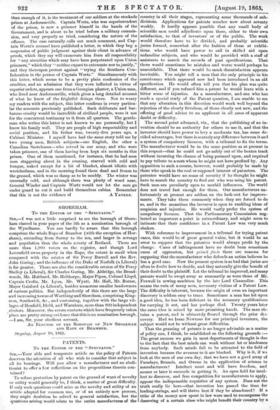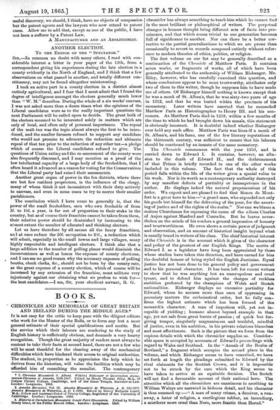PATENTS.
To THE EDITOR OF THE "SPECTATOR." SIR,—Your able and temperate article on the policy of Patents deserves the attention of all who wish to consider that subject in all its bearings. Will you allow a manufacturer and an aboli- tionist to offer a few reflections on the propositions therein con- tained?
To refuse protection by patent on the ground of want of novelty or utility would generally be, I think, a matter of great difficulty. If only such questions could arise as the novelty and utility of an article adapted for common use, or of an entirely new process, they might doubtless be solved to general satisfaction, but the questions arising would relate to the entire manufactures of the country in all their stages, representing some thousands of sub- divisions. Applications for patents number now about seventy weekly. It hardly appears possible that any small body of scientific men could adjudicate upon these, either to their own satisfaction, to that of inventors' or of the public. The work would therefore have to be divided, and probably scientific juries formed, somewhat after the fashion of those at exhibi- tions, who would have power to call in skilled aid upon unfamiliar subjects, and who would be provided with a staff of assistants to search the records of past specifications. That there would sometimes be mistakes and worse would perhaps be unavoidable. That there would be much dissatisfaction appears inevitable. You might tell a man that the only principle in his contrivance which appeared new had been introduced in an old specification. He would often tell you that his plan was quite different, and if you refused him a patent he would leave with a bitter sense of injustice. As a manufacturer, and one who has made a special study of the Patent question, I am unable to see that any alteration in this direction would work well beyond the rejection of the clearly frivolous, of those clearly not new, and the offering of good advice to an applicant in all eases of apparent doubt or difficulty.
The second point advanced, viz., that the publishing of an in- vention should be an authority for others to use it, and that the inventor should have power to levy a moderate tax, has some de- cided advantages, but there is scarcely any difference between it and a system of compulsory licences, with a tribunal to fix the terms. The manufacturer would be in the same position as at present in this respect—that he could not go safely out of the beaten track without incurring the chance of being pounced upon, and required to pay tribute to a man whom he might not have profited by. Any opposition to such a course, however, would probably be made by those who speak in the real or supposed interest of patentees. The patentee would have no sense of security if he thought he might have to search the country to find out who was using his patent. Such men are peculiarly open to morbid influences. The world does not travel fast enough for them. Our manufacturers un- fortunately at present are seldom on the look-out for improve- ments. They take them commonly when they are forced to do so, and in the meantime the inventor is open to rankling ideas of suspicion and injustice. He would vastly prefer the system of compulsory licences. That the Parliamentary Commission neg- lected so important a point is extraordinary, and might seem to intimate that their confidence in a Patent Law was very much shaken.
With reference to improvement in a tribunal for trying patent cases, this would be of great general value, but it would be an error to suppose that the patentee would always profit by the change. Cases of infringement have no doubt been sometimes cases of oppression, but prima facie there are reasons for supposing that the manufacturer who defends an action believes he has a good case. Now the present system is so bad that juries are often in doubt how to decide, and they naturally give the benefit of their doubt to the plaintiff. Let the tribunal be improved, and many patents would be swept away as summarily as were those of Mr. Foxwell in sewing machines by the late Lord Chancellor. This means the ruin of many men, necessary victims of a Patent Law. The difficulty is inherent, because the origin of even an important discovery is seldom easy to trace. Sometimes a man has bit upon a good idea, he has been deficient in the necessary qualifications for carrying it out, and has perhaps died. Twenty years later the same idea is seized by more promising hands. The man ob- tains a patent, and is ultimately floored through the prior dii- covery. Had we Isaac Newtons for our principal inventors, the subject would not be without great difficulties.
That the granting of patents is no longer advisable as 'a matter of policy can, I think be established on the following grounds :— The great success we gain in most departments of thought is due to the fact that the best minds can work without let or hindrance from anybody. Such minds fail to be attracted to the field of invention because the avenues to it are blocked. Why is it, if we look at the men of our own day, that we have not a good array of Faradays, Brunela and Owens in the application of science to manufacturers? Intellect must and will have freedom, and sooner or later it succeeds in getting it. An open field for intel- lect to discover, and free competition for manufacturers to apply, appear the indispensable requisites of any system. Does not the truth really lie here—that invention has passed the time for leading-strings, and will thrive best if they be abandoned? If a tithe of the money now spent in law were used to recompense the deserving of a certain class who might benefit their country by a useful discovery, we should, I think, have no objects of compassion but the patent agents and the lawyers who now attend to patent cases. Allow me to add that, except as one of the public, I have not been a sufferer by a Patent Law.
A MANUFACTURER AND AN ABOLITIONIST.































 Previous page
Previous page